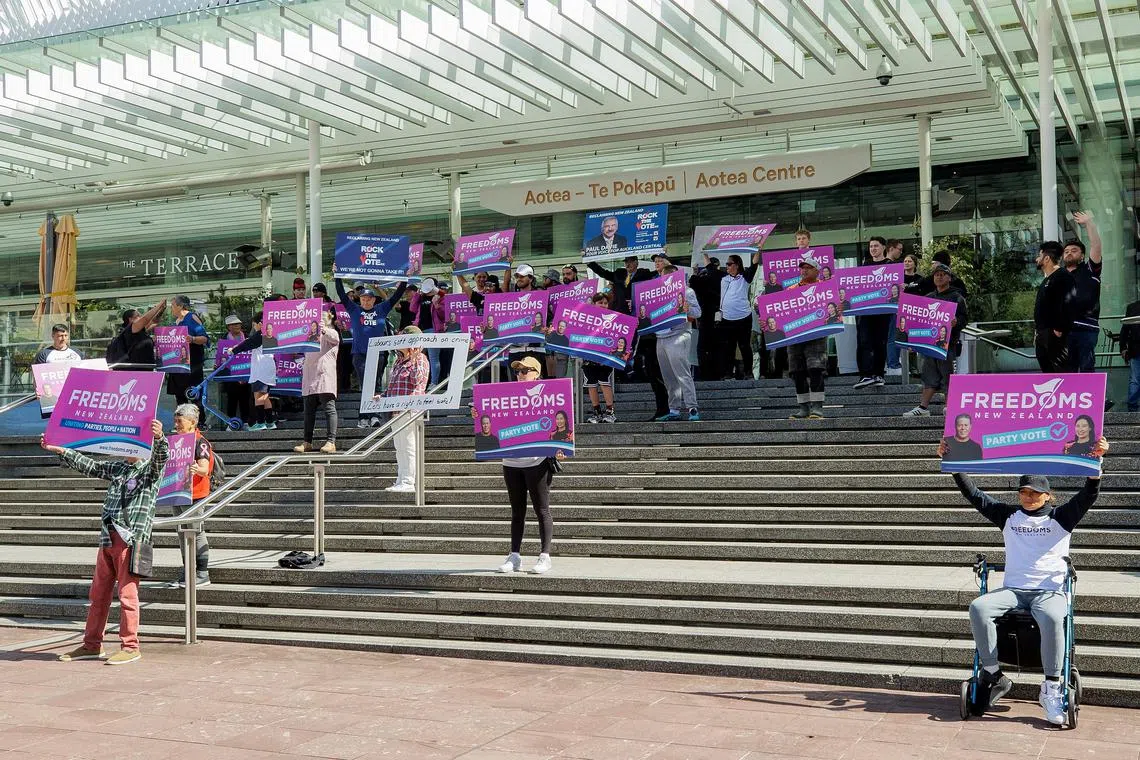New Zealand’s economy poses challenge for election victor
Sign up now: Get insights on Asia's fast-moving developments

Supporters of the Freedoms New Zealand party demonstrating at the Labour Party’s election campaign launch event in Auckland on Sept 2.
PHOTO: REUTERS
Follow topic:
WELLINGTON - New Zealand’s major parties have promised voters cost-of-living relief if they win Saturday’s general election,
That will stiffen the challenge for the nation’s two major parties, the centre-left Labour Party and the centre-right National Party, to deliver on its agenda, with rising prices and government debt having been hot-button election issues.
The new government also faces a current account deficit, which has spiralled to levels that are of concern to rating agencies, a budget in deficit since 2019, rents at record highs, unaffordable house prices, a labour market losing strength and an economy teetering on the brink of recession.
Much of this is beyond the immediate fix of any government, yet there will be expectations for the incoming administration to ease financial pressures on families and businesses.
The new government has the added responsibility of practising fiscal prudence, not only because the pre-election fiscal update forecasts three more years of deficits but because the central bank has warned that any fiscal stimulus will make the inflation battle more difficult.
“The Reserve Bank will need the government to do its bit if it is to cap the cash rate at the 5.5 per cent it currently suggests,” analysts at Bank of New Zealand said in a note.
They said the market was concerned that a right-leaning grouping will not be able to fund tax cuts and that a left-leaning government will not be able to curtail spending as forecast.
Polls show that National will most likely get the largest share of the vote
National has pledged to tackle the rising cost of living by cutting income taxes. It says the plan can be funded by taxing foreign buyers of any NZ$2 million-plus (S$1.6 million) house. The opposition argues that would be insufficient to cover proposed tax cuts.
For a single average income earner with no children, the tax cuts equate to NZ$24.85 a week, or about a 2.4 per cent increase in take-home pay, according to data from Statistics New Zealand and the National Party’s “tax calculator”.
Annual inflation in New Zealand is now running at a historically high rate of 6 per cent.
The National Party’s platform also includes returning the Reserve Bank of New Zealand’s goal to primarily focus on containing inflation and jettisoning recent additions of an employment mandate, a shift analysts say may give the central bank a more hawkish bias.
Labour, on the other hand, is promising to reduce the 15 per cent goods and services tax
Debt, and more debt
The biggest challenge for many New Zealanders is mortgage rates. The country’s households owe NZ$346.4 billion in home mortgage debt, and loans in arrears now total NZ$1.3 billion, up 65 per cent from 12 months ago.
It looks unlikely that there will be any relief on that front.
The Reserve Bank of New Zealand said last week that it would not lower the official cash rate from its 15-year high until it was certain that inflation was heading back to its target band of 1 per cent to 3 per cent, and it did not entirely rule out the possibility of further increases.
The public sector has debt problems of its own, having run up record budget deficits through the pandemic and a gross debt pile of NZ$155 billion.
At the same time, government borrowing costs are increasing and the country’s ballooning current account deficit poses a risk to the country’s credit rating.
Mr Kelly Eckhold, chief economist at Westpac New Zealand, said tough fiscal choices face an incoming government.
“Unless the government is prepared to run higher operating deficits and higher levels of debt, future budgets will likely require further cuts to spending and/or additional sources of revenue,” he said. REUTERS

